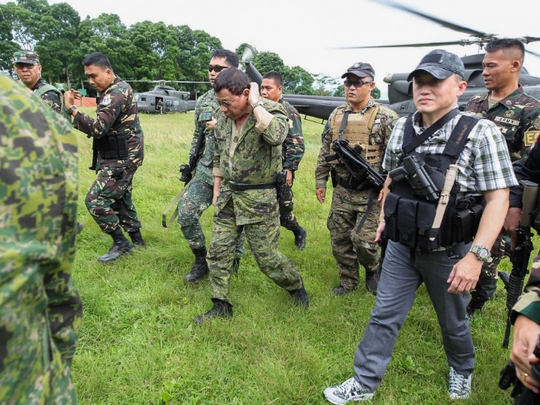
MANILA, Philippines: Philippine President Rodrigo Duterte may declare nationwide martial law next week if threatened massive protests by communists and other leftists against his rule turn violent or disrupt the country, his defence chief said Friday, but added that the chance of that happening is remote.
"He said, if the left will try to have a massive protest, start fires on the streets, they will disrupt the country, then I might (declare martial law)," Defence Secretary Delfin Lorenzana was quoted by AFP as saying on Friday.
AFP later corrected their story and Tweeted about removing "next week" reference and deleted an earlier tweet.
#CORRECTION #BREAKING Philippines' Duterte may declare martial law: defence chief (removing 'next week' reference, deleting earlier tweet)
— AFP news agency (@AFP) September 15, 2017
'Remote possibility'
The Philippine Daily Inquirer has quoted Lorenzana as saying that the declaration of a nationwide martial law, however, is a “remote possibility.”
Martial Law is already in place on the island of Mindanao in the south following the attack of Daesh-affilliate Maute group in Marawi City.
Congress' authority for the limited Martial Law in Mindanao was renewed by Congress and remains in place till December 31, 2017.
Duterte had earlier said he would be forced to declare a nationwide martial law if the communist rebels bring their armed struggle to the streets.
“Sinabi na rin ni Presidente ‘yan eh: Sabi niya, kung the… mga… ‘yung left, sabi niya, ‘Kung left will try to have a massive protest, magsunog sila sa kalsada, they will disrupt the country, then I might.’”
(“The President has said it. 'If the left will try to have a massive protest, burn stuff on public roads, they will disrupt the country, then I might'.”)
“He gave the reason…But I don’t think — in my opinion, my estimate — there is remote possibility,” Lorenzana said in a Palace briefing.
The defense chief said the President was only “concerned that it (rebellion) might get out of hand.”
“So sabi niya (He said), ‘I might declare martial law.’ But I don’t think the possibility that the left will be able to conduct a massive demonstration across the country, disrupting the civil government or the lives of the people, eh hindi naman siguro mangyayari ‘yun (I don’t think that will happen),” he said.
Suspension of classes, government work
Duterte earlier said he is considering suspending government work and classes amid plans of several groups, led by the Movement Against Tyranny, to stage a massive protest.
Here's your official, signed invitation to the Sept. 21 Luneta rally. Feel free to share. See you!#StopTheKillings #NeverAgain pic.twitter.com/EK5VzVIbdU
— Mvnt Against Tyranny (@TheMovementPHL) September 9, 2017
"This early, I am announcing that I am ordering a holiday para walang masaktan…kung may demonstration diyan...magkagulo. Walang trabaho ang gobyerno ‘yang araw na 'yan at ang klase suspended (so no one will be hurt… if there’s a demonstration...chaos erupts. No work for government employees on that day and classes will be suspended," Duterte said without mentioning a date.
Duterte made the statement in an interview with news anchor and broadcaster Erwin Tulfo, a transcript of which was provided to the Manila media on Friday.
Lorenzana confirmed Duterte’s plan.
If there’s a massive rally in Manila and it might inconvenience the public, a government holiday will be declared," Lorenzana recalled the President as saying.
He added that the date could be September 21, the 45th anniversary of the martial law declaration of the late dictator Ferdinand Marcos.
Movement Against Tyranny, a multisectoral group against “fascism and militarist rule of the Duterte government,” is set to hold a rally at Luneta Park on September 21.
What is Martial Law?
Section 18, Article VII of the 1987 Philippine Constitution states that the President, as commander-in-chief, may “in case of invasion or rebellion, when the public safety requires it” suspend the privilege of the writ of habeas corpus or place the country under martial law.
The martial law period or suspension of the writ of habeas corpus should, however, not exceed 60 days. The writ safeguards individual freedom against arbitrary state action.
The 1987 Philippine Constitution specifies that a state of martial law cannot override the function of both the judiciary and legislative branches of the government.
The Constitution also does not “authorize the conferment of jurisdiction on military courts and agencies over civilians where civil courts are able to function."
A state of martial law does not automatically suspend the privilege of the writ of habeas corpus.
Its suspension shall only apply to "persons judicially charged for rebellion or offenses inherent in or directly connected with the invasion."
During the suspension of the privilege of the writ, those arrested or detained shall be judicially charged within three days — or otherwise released.












